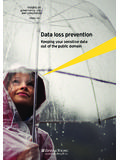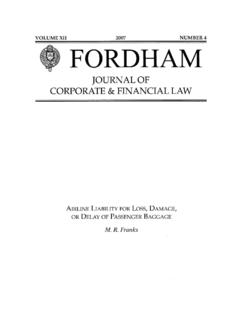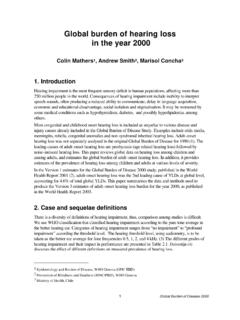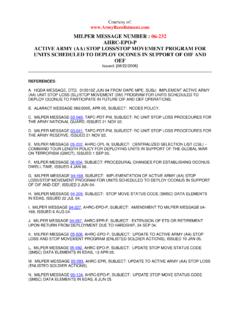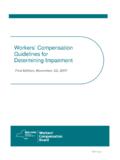Transcription of Hearing loss - WHO | World Health Organization
1 Hearing loss due to recreational exposure to loud sounds A review World Health Organization Hearing loss due to recreational exposure to loud sounds A review World Health Organization WHO Library Cataloguing-in-Publication Data World Health Organization 2015 All rights reserved. Publications of the World Health Organization are available on the WHO website ( ) or can be purchased from WHO Press, World Health Organization , 20 Avenue Appia, 1211 Geneva 27, Switzerland (tel.)
2 : +41 22 791 3264; fax: +41 22 791 4857; e-mail: Requests for permission to reproduce or translate WHO publications whether for sale or for non-commercial distribution should be addressed to WHO Press through the WHO website ( ). The designations employed and the presentation of the material in this publication do not imply the expression of any opinion whatsoever on the part of the World Health Organization concerning the legal status of any country, territory, city or area or of its authorities, or concerning the delimitation of its frontiers or boundaries.
3 Dotted lines on maps represent approximate border lines for which there may not yet be full agreement. The mention of specific companies or of certain manufacturers products does not imply that they are endorsed or recommended by the World Health Organization in preference to others of a similar nature that are not mentioned. Errors and omissions excepted, the names of proprietary products are distinguished by initial capital letters. All reasonable precautions have been taken by the World Health Organization to verify the information contained in this publication.
4 However, the published material is being distributed without warranty of any kind, either expressed or implied. The responsibility for the interpretation and use of the material lies with the reader. In no event shall the World Health Organization be liable for damages arising from its use. iii Contents Introduction Cause for concern How we hear How noise affects the ears Temporary or permanent threshold shift Tinnitus Effect of noise-induced Hearing loss on presbyacusis (age-related Hearing loss ) Predisposing factors How can noise-induced Hearing loss be treated?
5 Other negative impacts of loud sounds Road safety What is safe listening? Preventing noise-induced Hearing loss Prevention Strategies What is being done? Legislation What can be done? References 1 Introduction Excessive noise is increasingly encountered in many aspects of day-to-day life. Among the many people exposed to noise at their place of work, occupational Hearing loss is common, and the cost of compensation is extremely high (1). Environmental noise from non-occupational sources such as traffic is also increasing and is responsible for an estimated 1 million DALYs (disability-adjusted life years) in western European countries, implying an annual loss of 1 million life years in that part of the World (2).
6 Additionally, concern is growing about the ever-greater exposure to noise in recreational settings: unsafe levels of sound are frequently experienced in a variety of non-occupational settings such as nightclubs, discotheques, pubs, bars, cinemas, concerts, live sporting events and even fitness classes (3 7). Moreover, recreational devices such as personal music players and video game consoles that emit sounds are commonly operated at unsafe volumes. Hearing can be damaged by regular participation in these loud activities (8 11).
7 How we hear Ears are the organs that process sounds, enabling the brain to interpret what the individual is Hearing . The ear is divided into three parts outer ear, middle ear, inner ear each of which has a unique function in the process of Hearing . In simple terms, the outer and middle ears amplify the sound signal (vibration) and the inner ear converts this sound signal into an electrical impulse that is transmitted to the brain. This process also produces a frequency (or pitch) and intensity (or loudness) analysis of the sound signal.
8 Sounds are complex mixtures of pressure variations and travel in invisible waves through air. When these sound waves reach the ear, the pinna (ear flap) funnels the sound waves into the ear canal. Sound waves travel down the canal to the eardrum, causing it to vibrate. The vibrations are transmitted by the ossicles (three small bones) within the ear to the cochlea, causing movement of the fluid and the sensory cells (hair cells) within the cochlea. The sensory cells convert the vibrations into electrical nerve signals that travel along the auditory nerve to the brain.
9 The brain then interprets these signals as sounds that can be recognized and understood. 2 There are two types of sensory cells within the cochlea: inner and outer hair cells. The inner hair cells generate the electrical signals that are sent to the brain, while the outer hair cells act as amplifiers, increasing the stimulus delivered to the inner hair cells (19). It is important to note that a fixed number of these cochlea sensory cells is present at birth: in humans and other mammalian species, these sensory cells do not regenerate once they have been damaged (20).
10 How noise affects our ears Excessive exposure to noise both long-term, repeated exposure to noise and a single exposure to an extremely intense sound causes damage to the auditory system and results in Hearing loss , termed noise-induced Hearing loss (21 24). The Hearing loss is usually slow in onset but progresses relentlessly for as long as the exposure continues (25). Indeed, the harmful effects may continue long after noise exposure has ceased (26); they are irreversible (20, 23).











